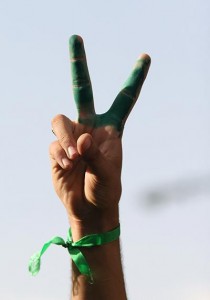Tuesday
Mar302010
Iran: The Green Movement's Next Steps (Shahryar)
 Tuesday, March 30, 2010 at 6:46
Tuesday, March 30, 2010 at 6:46  Josh Shahryar writes for EA:
Josh Shahryar writes for EA:Yesterday was the funeral in Qom of Banoo Rabbani, the wife of Grand Ayatollah Hossein-Ali Montazeri. Despite claims by some activists that Greens were going to join the funeral and protest, the atmosphere for most participants was one of silent contemplation. Security forces essentially took over the funeral procession,arresting 30 people, and Rabbani was not even buried in the location selected by her family.
The funeral follows Chahrshanbeh Suri, the Fire Festival, on 16 March. Although there was much celebration, despite the disapproval of authorities including a Supreme Leader fatwa, no protest was planned or executed by the Green Movement.
So is the decision not to use public holidays or funerals for staging protests a bad one by the Movement?
The answer is no. The movement has endured for more than nine months. It has sufficient backing and is confident enough that it will survive, despite every repressive measure of the regime, that it does not have to periodically show the world, the Iranian government, and ordinary Iranians that it can put people on the streets. At the same time, the Greens have made clear that they will not be backing down from their demands, let alone giving up.
Mir Hossein Mousavi's Nowruz address clearly hinted at this, as he . declared, "Withdrawing our demands of unconditional execution of the Constitution is an act of treason for Iran and for Islam. This is a demand that we will not abandon."
So next question: What is the Green Movement going to do if not hold protests on holidays?
Again, Mousavi's address offers a good answer:
Faced with such a situation [overwhelming violence by the government], the Green Movement must expand its reach to all segments of society. The Green Movement must revive the timeless social and Islamic principle of inclusion. We must lend a hand to neighbors and neighborhoods both near and far, through job creation and other forms of interaction.
This Iranian Year 1389, according to Mousavi, is the year of "persistence". Several activists with whom I have spoken are hopeful that within the next few months, the Green Movement will not only survive but also thrive as it wins more supporters to its side.
Indeed, their resolve is that they need not just a majority of Iran's people to back them, but an overwhelming majority. One activist noted that next time they hold a protest in Tehran, they don't want "only" one or two million participants but hope to have as much as half the city on the streets.
Only time will demonstrate how successful this will be. The Green Movement, though, is not just a spontaneous mass of discontented citizens, but an organized and well-informed movement whose members are slowly building up networks within the country and unifying their goals, all the while preparing for future confrontations with the Government.
